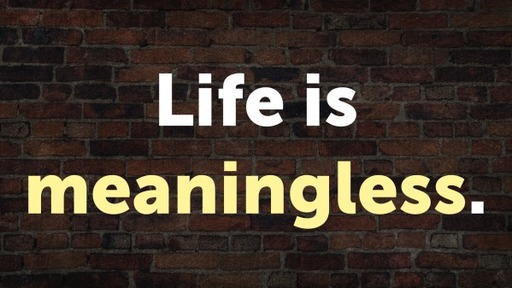Silence

Notes
Transcript
Life is meaningless.
Life is meaningless.
What a statement. At first glance it seems hopeless. But yet, there are moments in life when this very well may be our outlook. However, I believe this is also a statement of hope.
We are in the midst of a pandemic. A plague like no other.
The Psalms as Christian Lament: A Historical Commentary III. Erasmus’ Use of Psalm 39 as a Pastoral Theology
among so many plagues, there is none more pestilential, than tongues dipped in deadly poison—they reign supreme in this age more than any other.
This quote is from 1532. In actuality there was no “major pandemic/plague” as the Bubonic Plague was coming to a slow. Yet, Erasmus, saw something greater than any bacteria or virus. Something harder to contain and much more deadly. The plague of words.
Life is full of noise.
Life is full of noise.
And at times it seems to be getting filled with more and more noise.
Bad things happen to Christ followers.
Bad things happen to Christ followers.
This is another truth of Scripture and of life. Scripture of course being what is more important of the two. You are not a bad Christian because you suffer from mental health issues. You are not a bad Christian because you suffer from disease which is part of life.
Now this doesn’t mean we must “resign” ourselves to the realities of life. We have a choice in how we will respond. This is the beauty of the Psalms; they teach us a myriad of ways to respond to live.
Pain happens.
Pain happens.
This is a natural occurence in life. It is the effects, consequences and result of sin. We normally talk about the problem of pain, and rightly so. But maybe, like Dr. Paul Brand spent most of his career trying to work with those who did not experience physical pain, leprosy. This gave him a greater appreciation for the complexity of creation our bodies, and yes even pain. He would go on to talk about the “gift of pain”.
Where is God when I hurt?
Where is God when I hurt?
This is a question which comes out of the fact, pain will be part of life.
We cover pain by being loud.
We cover pain by being loud.
I am not just talking about groaning and moaning. I am talking about how we behave in general, even though we may be unaware we are in pain.
We must learn the gift of silence.
We must learn the gift of silence.
I wonder if we do not feel “compelled” to speak about Christ because we have not sat silent enough for the passion and fire to build.
Silence helps not give those who do not walk in light of Christ any more reason to reject him. Silence also allows us to be heard when we, as individuals and the church, actually speak.
“The deepest thing in a human heart is not verbiage but is actually…the silence of intimacy where no word is needed and where a word would actually be a fracture.” -John O-Donohue
What is the cause of my pain? What is my pain “saying”?
What is the cause of my pain? What is my pain “saying”?
As we are silent if we are willing to ask this question and allow the journey lead us to the answer, we will discern and sift out the bad from the good. We will then be able to speak and no longer need to muzzle ourselves.
Our pain needs to drive us to Christ.
Our pain needs to drive us to Christ.
Silence will only work so long. And I am not saying we deny what is going on. I tend to be very open, vulnerable and honest. Yet, I try first to always take my pain, stress, and issues to Christ and then express it to others. I have a long way to go in this journey.
Pain can be redeemed.
Pain can be redeemed.
This is the hope of Christ. Christ did not just experience pain but because of his resurrection redeemed pain.
God is adequate, even in our inadequacy.
God is adequate, even in our inadequacy.
This Psalm reminds us of our inability to conquer pain, trials, sin, and life on our own.
Christ alone is your deliverer.
Christ alone is your deliverer.
Don’t miss this. Tucked in the background, seeping out towards the end is the realization the God alone is judge and deliverer. Yes, sometimes the silence of God is unnerving. Sometimes we just want him to leave us alone. Yet, he is adequate to deliver us from our pain. He alone delivers us from sin. He alone delivers us!
On my spiritual journey this year I came across this quote: “God is a jealous lover. He will not share you, so don’t give yourself to anyone but him. He’s unwilling to work in your will unless you’re willing to be entirely his, and his alone. He’s not asking for your help. He’s asking for you.”
